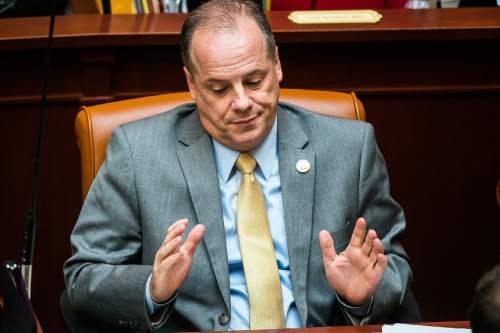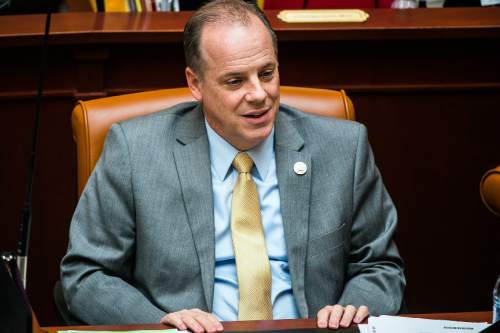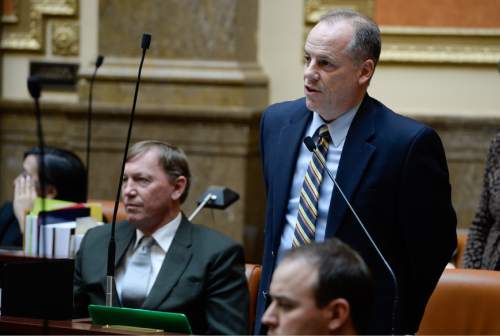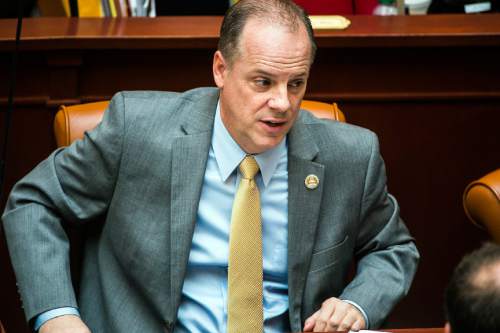This is an archived article that was published on sltrib.com in 2015, and information in the article may be outdated. It is provided only for personal research purposes and may not be reprinted.
A Utah legislator says the news media quoted him out of context saying he questioned whether sex with an unconscious person always amounts to rape.
But, in the wake of a "brutal" backlash, he is apologizing for any pain that his words caused.
"I should have been more careful. I want to take ownership for that. The [media] reports don't clearly reflect my intent or my position or my beliefs," Rep. Brian Greene, R-Pleasant Grove, told The Salt Lake Tribune on Wednesday.
He also issued a written statement seeking to clarify his position in the wake of scathing criticism in social media and after his comments appeared online everywhere from The New York Times to Cosmopolitan magazine.
"It's been brutal," Greene said about the response. "There's been a lot of communication. I'll just leave it at that."
Greene was among a handful of male committee members Tuesday parsing the language in Salt Lake City Democratic Rep. Angela Romero's HB74 that is meant to simplify Utah's definition of consent in sexual-assault cases.
Some lawmakers worry the legislation could have implications for sex between longtime partners and husbands and wives.
Romero says the measure would make it clear sex with an incapacitated person — whether from medication, head injury or mental disability — would be rape.
The bill passed unanimously and was sent to the full House.
During Tuesday's debate Greene said: "If an individual has sex with their wife while she is unconscious ... a prosecutor could then charge that spouse with rape, theoretically." He later added, "That makes sense in a first-date scenario, but to me, not where people have a history of years of sexual activity."
On Wednesday, he told The Tribune, "I understand that, in isolation, some of the words I chose could be interpreted in an ugly way. It was never my intention. I am supportive of the bill and have been from the beginning, and I voted for it."
He added, "I just wanted the committee to be sure what we were doing."
The bill's Senate sponsor, Woods Cross Republican Todd Weiler, said he believed Greene was "stammering for an example" but "didn't choose the right one."
"I take his comments more that he was questioning whether the bill went too far," Weiler said, "rather than saying it was OK to rape an unconscious spouse."
Greene's comments Tuesday raised the measure's profile, Weiler said, and "probably inadvertently helped the bill just because it got so much media attention."
Romero said Greene met later with her to explain his comments, but it wasn't an apology.
"I appreciate him clarifying," she said. "He said what he was trying to address wasn't worded correctly."
Romero said she does not believe Greene's comments were intended to be malicious.
"I think they weren't thought out." Romero added she is satisfied with his explanation and apology for any hurt from his words.
Greene told The Tribune, "People are understandably upset because they believe I have staked out a position that is certainly not my intention. If it were, the anger would be understandable."
He said that sex with an unconscious person "is terrible conduct. I said that as many as three times in my comments [in committee]. I'm not condoning it. It's abhorrent. I hope it never happens."
House leaders said Greene responded appropriately Wednesday in attempting to clarify his comments and his intentions.
House Speaker Greg Hughes, R-Draper, said he talked to Greene about his comments shortly after he read the news reports, and the Utah County legislator already was thinking about fixing his gaffe.
"I think that when the coverage came out, no one had to suggest anything," he said. "I think there was a desire to clarify inherently."
Hughes added, "I think he could have chosen his words better. But I think he's made a statement to that effect."
And House Majority Leader Jim Dunnigan, R-Taylorsville, said, "I just hope that my colleagues would be thoughtful in their thought process, particularly on this issue."
Greene said the controversy has been a learning experience.
"It is unfortunate that things were reported that way," he said. "To the extent I can prevent that in the future by choosing my words more carefully, I certainly will do that."
His written statement said, "I was concerned about a change in statutory language that would remove the element of consent and might have some unintended consequences. I was attempting to clarify the issue through the committee's discussion."
It added, "I'm sorry for any unintended pain that my statements have caused."









